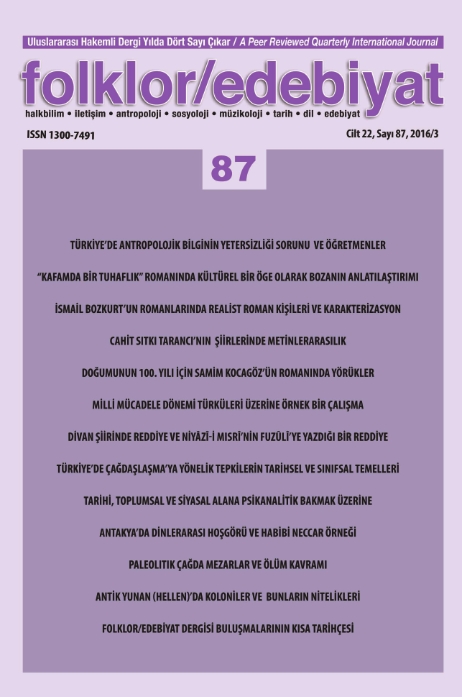Divan Şiirinde Reddiye Ve Niyâzî-İ Misrî’nin Fuzûlî’ye Yazdiği Bir Reddiye
“Reddiye” in The Ottoman Poetry and a “Reddiye” of Niyazi-I Misri For Fuzuli
Author(s): Belde AkaSubject(s): Cultural history, Poetry, Turkish Literature, Cultural Anthropology / Ethnology, The Ottoman Empire
Published by: Uluslararası Kıbrıs Üniversitesi
Keywords: “Nazire”; “nakiza”; “reddiye”; Fuzûlî; Niyâzî-i Mısrî;
Summary/Abstract: “Reddiye”, which is derived from the word “redd” in Arabic, is described as a kind of text that is written for rejection of an idea. Furthermore, in Divan poetry, poems that are written for rejection of an idea in another poem are accepted as reddiye. Reddiyes are poems that should be considered in the nazire tradition of Divan poetry, since they are poems like “nakiza/ nakize”. As is well known, “nazire” means similar poem that is written for a poet’s poem with the same rhythm and rhyme. Nazire writing tradition, which is quite common among Divan poets, is also significant since it functions as a school that trains poets. The difference between nakiza and nazire is that in nakiza, there are opposite ideas, not similar, to ideas in the original poem. In reddiyes, it is also opposed to the ideas in the original poem, as in nakizas. However, the difference between reddiyes and nakizas is that reddiyes are the poems, which are written to oppose ideas about religion and worship. In this article, reddiye will be defined and its features will be determined by using the literature mentioned, and 17th century poet, Niyâzî-i Mısrî’s reddiye, which is written for 16th century poet, Fuzûlî’s “gazel” that is about his ideas on worship will be analyzed. To conclude, this article basically tries to explain “reddiye” writing tradition with gazel poem in Divan poetry by examining the poems in question.
Journal: Folklor/Edebiyat
- Issue Year: 22/2016
- Issue No: 87
- Page Range: 115-122
- Page Count: 8
- Language: Turkish

